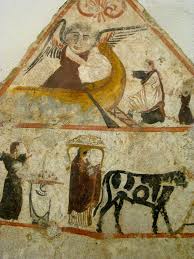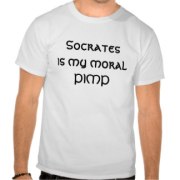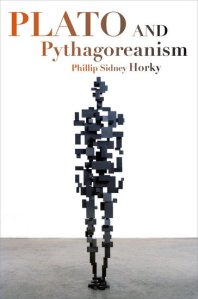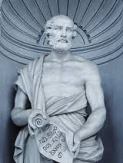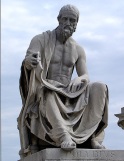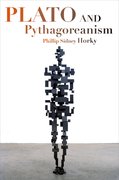For some time now, I’ve been thinking about the place that ancient philosophers from Italy who were not thought to be either Greek or Roman has played in the development of Roman philosophy. I’m working on a piece for the Oxford Handbook of Roman Philosophy (edited by Will Shearin and Richard Fletcher) on precisely this topic, which is a difficult one for several reasons: first, there exists no well-established scholarly discourse about the topic at present; second, the evidence is often obscure, fragmentary, or (a constant problem nowadays for me) embedded in Hellenistic Platonism-Pythagoreanism; and third, most of the texts have no reliable translations in modern languages. Before submitting the piece for consideration, I plan to present it as a talk entitled ‘Italic Philosophy’ at the second leg of the Milan-Durham Joint Seminar on Platonism and Hellenistic Philosophy (11-12 December, 2014, at the Dipartmento di Filosofia, Universita degli Studi di Milano).
By way of preview, here’s a bit I’ve written concerning the Italic people who were thought to have cultivated the most philosophers, the Lucanians.
A number of Lucanian philosophers had been known in antiquity, and some Hellenistic texts purporting to have been written by these figures survive. Their imprint was left on Aristoxenus of Tarentum, who, writing in the late 4th Century BCE, mentions several non-Greek philosophers who hailed from Italy in his list of Pythagorean philosophers. Among the Lucanians, he refers (apud Iambl. VP 267) to two brothers named Occelus and Occilus of Lucania, as well as their sisters Occelo and Eccelo. Texts survive under the name of Occelus and a certain Eccelus, which might have originally been an unnecessary correction of Eccelo, but nothing survives for Occilus or Occelo. Additionally, Aristoxenus refers to two other Lucanian philosophers by name: a Cerambus, otherwise totally unknown, and a certain Aresandrus, whose name might have been corrupted to become ‘Aresas’, a figure who is better known, and for whom a substantial fragment of a work entitled On the Nature of Man survives. The historical Aresas of Lucania was considered the last ‘diadoch’ or leader of the school that traced itself back to Pythagoras, who then imparted his learning to Diodorus of Aspendus, who publicized the Pythagorean acusmata widely in Greece (Iambl. VP 265). Plutarch (de Gen. Socr. 13) believed that Aresas was one of the last Pythagoreans to stay in Magna Graecia, remaining in Sicily after the Cylonian conspiracy tore the Pythagorean communities apart, and visiting with Gorgias of Leontini. This information would place the historical Aresas in the early part of the second half of the 5th Century BCE, a Pythagorean with connections to sophistry. Such connections between Pythagoreanism after the Cylonian Conspiracy and sophistry are well-attested both in the genuine writings of Archytas of Tarentum and in the Pythagorean Pseudepigrapha associated with Archytas and, as we will see, Aresas of Lucania. The surviving fragment attributed to Aresas, from a work called On the Nature of Man, features an inquiry into human nature that focuses on human psychology, by reference to law and justice:
The nature of man seems to me to be a standard of law and justice, as well as a standard of the household and the city. For if someone were to pursue its tracks and search for it in himself, he would discover it; after all, law and the justice in him are the order of the soul. For the soul, being triple, gives order in three activities: <mind> produces thought and wisdom, <courage> produces strength and power, and desire produces love and kindness. And all of these things have been ordered with regard to one another in such a way that the most authoritative part leads, the worse part is ruled, and the middle part occupies the middle order, and it rules and is ruled. God contrived these things in the modelling and completion of the human body in such a way that he considered man alone, and none of the other mortal animals, to admit of law and justice.
(From ‘Aresas’ F 1 =Stob. 1.49.27 p. 355 Wachsmuth = pp. 48.20-50.23 Thesleff)
‘Aresas’ expands upon the Platonic theory of the tripartition of the soul, using the same terms Plato employed in the Republic, but adding in concepts and vocabulary from the Peripatetic tradition – adapting ideas that are found equally in Aristotle’s Politics and, perhaps closer to this text, the On Law and Justice attributed to the Pythagorean Archytas of Tarentum, which may be one of the earliest of the Pythagorean Pseudepigrapha (possibly composed in the late 4th Century BCE, as argued publicly by myself and Monte Ransome Johnson in a recent presentation in Durham). The ghost of Aristoxenus, who wrote a life of Archytas that may have been the ultimate source for the On Law and Justice, is in the background here too, as ‘Aresas’’ Pythagoreanism is presented in terms that resonate with Aristoxenus’ own descriptions of Pythagorean ethics. Moreover, there is a Sophistic tendency here to associate the gift of law and justice to humans by God with ‘Aresas’, echoing similar ideas in the so-called ‘Great Speech’ of Protagoras, and the defense of law and justice in the work known as Anonymus Iamblichi, often thought to be a student of Protagoras. In this way, ‘Aresas’ appears to combine doctrines about the importance of law and justice, familiar from the Sophistic tradition, with a joint Platonic-Pythagorean presentation of the soul. But things get more interesting philosophically a bit further down in the fragment, after ‘Aresas’ has described how the various parts of the soul must relate to one another when the disposition of the soul is properly harmonized:
Moreover, a certain concord and unity of mind accompanies this sort of disposition. And this sort of disposition would justly be called the ‘good order’ (eunomia) of the soul, the very thing which confers strength of virtue from the fact that the better rules, and the worse is ruled. Friendship, love, and kindness, since they are of the same stock and kind, sprouted from these parts. For mind, when it inspects closely, wins through persuasion, whereas desire loves for its own sake, and courage, filled with might and boiling with enmity, becomes beloved to desire. For mind, since it mixes pleasure with pain, adjusts the high-pitched and excessive part to the light and soluble part of the soul; each part, then, has differentiated a forethought of each thing according to whether it is of the same stock and kind – mind inspecting closely and tracking things, and courage adding impetus and force to the inspections; but desire, being of the same type as affection, refers a property to mind by acquiring pleasure and giving up what is contemplated to the contemplative part of the soul. By virtue of these very things, life for humans seems to me to be best, whenever pleasure is combined with seriousness, and enjoyment with virtue.
(From ‘Aresas’ F 1 =Stob. 1.49.27 p. 355 Wachsmuth = pp. 48.20-50.23 Thesleff)
‘Aresas’ continues the political themes here, referring to the disposition of the harmony of the parts of the soul as its eunomia, a word whose value to philosophical traditions seems to stream out of Sparta all the way back in the 8th Century BCE, obtain confirmation as early as Solon, and flourish among the Socratics, especially Xenophon and Plato, and some Sophists, such as Anonymus Iamblichi. Here, however, something relatively unique is advanced: the state of the soul being properly harmonized is called ‘well-lawed’, which is explained as the disposition in which the better element rules, and the worse is ruled. Some version of this thought is found in Plato’s Republic (462e), where Socrates and Glaucon conclude that a city-state which is well-lawed (eunomos) will, like the soul of an individual person, share in its affections. Similarly, the virtue of temperance, which is applied across the entire city-state of Kallipolis and throughout the entire individual soul, is understood to be “a concord between naturally worse and naturally better as to which of them should rule” (R. 432b). There is a catch, however, as Socrates later (R. 605b-c) clarifies: in a well-lawed city, those poets who might stimulate and arouse the worse part of the city-state to attack its ‘rational’ part should not be allowed to remain, for the reason that the rational part of the city-state, as well as the rational part of the soul, would be under threat.
Thus ‘Aresas’, the Lucanian ‘Pythagorean’, espouses a tripartite structure of the soul, without any reference to bipartition that would come to be the ‘truer’ version of the Platonic soul, according to Plutarch (de Virt. Mor. 3.441d-442a) in the late 1st Century CE, and that can be found in various parts of the corpus of Pythagorean Pseudepigrapha. The notion that Pythagoras initiated the claim that the soul is tripartite is advanced by Poseidonius, writing sometime around 100 BCE, citing some writings of Pythagoras’ pupils that cannot be identified with confidence (Poseidonius T 151 Kidd). Tripartition is also attested in a similar format by one of the best sources for Hellenistic Pythagoreanism, Alexander Polyhistor, in his Successions of the Philosophers, where he claims to have obtained the information from a work known as the Pythagorean Notebooks (Pythagorika Hypomnêmata), which also seem to date from the late 2nd-mid-1st Century BCE (D.L. 8.25, 8.30). The fragment of ‘Aresas’ represents what is perhaps the best surviving evidence for the psychological theory of the Hellenistic Pythagoreans, since it does not mention the more familiar bipartition found in the other Pythagorean Pseudepigrapha and in the writings of the middle Platonists. Indeed, ‘Aresas’ shows us a very original psychological theory, for he claims that three goods, friendship, love, and kindness, sprout from all three parts of the soul. How does this happen?
According to ‘Aresas’, the parts of the soul, when they have been harmonized into eunomia, work quite effectively together. Each performs its own duties, preserving the ‘justice’ so defined as ‘minding one’s own business’ in Plato’s Republic (433b-d). But ‘Aresas’ departs quite significantly from Plato, and from other writers of the Pythagorean Pseudepigrapha, in developing a unique psychological theory. For ‘mind’ performs preliminary inspections, and manages to persuade the other parts of the soul to act on its preliminary inspections; ‘desire’, persuaded to act, seeks to protect its own interests by pursuing ‘courage’, which, properly persuaded by mind, acts to defend the whole, and to attack the (external) enemy. How does ‘mind’ accomplish this? Interestingly, ‘Aresas’ claims that it mixes together pleasure and pain and, by doing so, effects the adjustment of the courageous part of the soul (called ‘high-pitched and excessive’), where pain belongs, to the desirous part (called ‘light and soluble’), where pleasure is located. The consequence of this adjustment, which finally leads to total psychic harmonization, is that the courageous and desirous parts of the soul obtain their own peculiar types of reason, exemplified by their capacities for diverse types of ‘forethought’. Mind inspects and tracks objects it pursues; courage impels the soul towards things being further inspected and endure what is to come; and desire discovers its own important role in this process, which is to acquire pleasure and refer intellectual pleasures, which belong not to itself, upwards to mind. ‘Aresas’ claims that humans are at their best when they combine the objects of contemplation and enjoyment together in this psychic system. This is no mention of mind enslaving or controlling the lower parts of the soul – mind’s primary role in ‘ruling’ the lower parts, indeed, is to get the ball rolling in the process of inquiry, rather than to supervise at all times each part of the soul’s activity, or to chastise the other parts of the soul for being disobedient. There is no familiar moderation of emotions, nor less their extirpation, as one would find in Hellenistic Philosophy and the other Pythagorean Pseudepigrapha.

